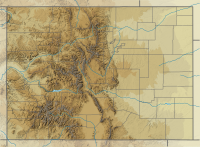The Gore Range (elevation approximately 12,000 ft) is a mountain range in the Rocky Mountains of north central Colorado in the United States. The native Ute name was the Shining Mountains.[1]
| Gore Range | |
|---|---|
 Buffalo Mountain (left) at the southern end of the Gore Range seen from Dillon Reservoir. | |
| Highest point | |
| Peak | Mount Powell |
| Elevation | 13,566 ft (4,135 m) |
| Listing | Mountain ranges of Colorado |
| Coordinates | 39°45′36″N 106°20′27″W / 39.76000°N 106.34083°W |
| Dimensions | |
| Length | 77 mi (124 km) N-S |
| Width | 46 mi (74 km) E-W |
| Area | 1,420 sq mi (3,700 km2) |
| Geography | |
| Country | United States |
| State | Colorado |
| Counties | |
| Parent range | Southern Rocky Mountains |
Geography
editThe range runs for approximately 60 miles (100 km) northwest-to-southeast, through western Grand and Summit counties, and eastern Routt and Eagle counties. They form the southern extension of the Park Range, extending southward from Rabbit Ears Pass (U.S. Highway 40) to the Eagle River and Gore Creek near Vail. The Colorado River passes through the range at Gore Canyon. The range forms part of the western boundary of Middle Park at the headwaters of the Colorado, separating it from the upper basin of the Yampa River to the west. The northern section of the range north of Gore Pass is somewhat lower than the southern section, along the western side of the valley of the Blue River. The ridges of the range are prominently visible on clear days from the summit of Trail Ridge Road in Rocky Mountain National Park approximately 50 miles (80 km) to the east. The range is traversed at its southern and southwestern lower flanks by Interstate 70 from Silverthorne to Vail. Much of the range is located within the Arapaho and White River National Forests, and large portions are protected within the Eagles Nest Wilderness.
History
editThe range was named for Sir St George Gore, 8th Baronet, an Irish hunter who visited the area in the 1850s on a notorious hunting expedition throughout the American West. Gore's three-year stopover in the American West had him traversing what is today the Dakotas, Montana, Wyoming and Colorado. The figures are difficult to substantiate, but Gore himself claimed to have killed more than 2,000 buffalo, 1,600 elk and deer and 100 bears for sport, with the carcasses being left to rot.[1]
Green Mountain Reservoir Trail
editGreen Mountain Reservoir Trail is in the northern Gore Range, part of the Rocky Mountains in the U.S. state of Colorado. It is located among the developed campgrounds along the shore of Green Mountain Reservoir, Summit County. Green Mountain Reservoir is north of Interstate 70, west of Highway 9, north of Silverthorne and near Heeney. Green Mountain projects skyward at the north end of Green Mountain Reservoir, with an escarpment that may interest rock climbers and abandoned mines that place the area in historical context. Below the peak, the surrounding hills are high desert, covered in sagebrush. Among the sagebrush, many wildflowers bloom. Green Mountain Trail winds through sagebrush fields among the campsites on the eastern shore of Green Mountain Reservoir. Wildflowers that may be found in late spring include buttercup, mountain ball cactus, moss campion, Wyoming paintbrush Castilleja and alpine phlox. Greatest Hikes in Central Colorado: Summit and Eagle Counties, a hiking guide by Kim Fenske, provides a description of Green Mountain Reservoir Trail.
See also
editReferences
edit- ^ a b "Colorado's Gore Range was named after a bloodthirsty 19th century aristocrat. Is it time for a change?". Retrieved 2018-09-01.
External links
edit- "Gore Range". Peakbagger.com.
- Photographs of the Gore Range
